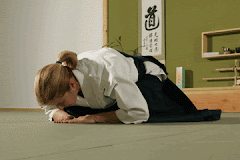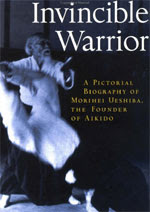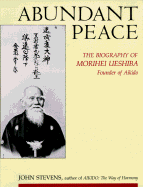By Marjorie Motooka, Shodan
A Hakama is the skirt-like pants that some Aikidoka wear. In our dojo it is worn by Yudansha (black belts) and Kenshusei (Teacher Training Apprentices). It is a traditional piece of Samurai clothing. The standard Gi worn in Aikido as well as in other martial arts such as Judo or Karate was originally underclothes.
The seven folds in the hakama (five in the front, two in the back) is said to have the following
symbolic meaning:
Jin (benevolence), Gi (honor or justice), Rei (courtesy and etiquette), Chi (wisdom, intelligence), Shin (sincerity), Chu (loyalty), and Koh (piety).
O'Sensei was said to have a strict policy of having his students wear a Hakama regardless of rank as it was reflective of the qualities held by the distinguished samurais of the past. ”Wearing it symbolizes traditions that have been passed down to us from generation to generation. Aikido is born of the bushido spirit of Japan, and in our practice we must strive to polish
the seven traditional virtues."
We should strive to live by the virtues that our Hakama represents, both on and off the mat. Only then can we mimic the true teachings of O'Sensei.
Wednesday, February 6, 2019
Saturday, October 6, 2018
What Does It All Mean? Dōmō Arigatō Gozaimashita
By Marjorie Motooka, Shodan
Dōmō Arigatō Gozaimashita (pr
In the Japanese language there is formal and informal speech. Formal speech is used when speaking to someone who is one’s superior (i.e. teacher, boss, elder) and informal speech is used when speaking to someone who is an equal or inferior (i.e. friend, employee, child).
If you are expressing gratitude to someone who is your superior, “Dōmo Arigatō Gozaimashita”
If you are expressing gratitude to someone who is your inferior, you would use “Dōmō Arigatō” or simply, “Dōmō.”
These phrases would be the English equivalent to “Thank you very much,” “Thank you” and “Thanks.”
Dōmō Arigatō Gozaimashita for stopping by and reading this blog. See you on the mat!
Wednesday, September 19, 2018
Joining the Kenshusei Program
By Stephanie Pardo, 4th Kyu
I joined the Kenshusei program because I wanted to dive deeper into a martial art that I loved. I thought, “What better way to explore my passion than join an intensive program, which focuses on just that?” The opportunity to join the program was presented to me and I took it without hesitation.
The Kenshusei program is a year commitment.
Kenshushi takes place in a healthy and safe space that challenges each participant to deal with discomfort. This discomfort is unique to each individual.
So why was I doing this? What kept me there?
I made a commitment and couldn’t just walk away. Well, in reality, yes, I could’ve stopped at any point and broken my commitment. Although I committed to a year, it was ultimately my own personal choice to see it through. Nothing was keeping me there… except myself.
I made the decision to join the Kenshusei program because of my love for Aikido. The Kenshusei program for me meant committing myself to a whole year of love. Becoming a Kenshusei brought me face to face with the depths of that devotion.
When I made the decision to become a Kenshusei it was easy because I didn't care about how hard it was going to be or what challenges I was sure to face along the way. I was excited to face those challenges because it would ultimately mean that I got to do something I loved everyday. I made the commitment first to myself, then to my Sensei, then the dojo, then to my fellow Aikidoka, etc. At the time I was unaware that by simply committing to a practice I loved I was ultimately making a deep commitment to myself. I was committing to what makes me happy, to my truth, my experience, my ambitions, my dreams and desires. When I committed myself to the Kenshusei program I was making a commitment to my purest self.
By committing to myself … I acknowledged that I believe in who I am, that I love myself, trust myself, care about myself, and want to do something for my own betterment… I uncovered the depths of self love. I had always believed in myself, but the difference now was that I had recognized it through this self commitment. This was the first time that I fully committed to something for me. Something that I believe in and love, something that was special in my heart. The Kenshusei program uncovered something that I needed — self commitment.
With that being said, I think it is important to be aware that there are two ways in which one commits to something — the first is out of fear and the other out of love.
When a commitment or decision is made out of fear, you are not being true to yourself, but rather you are making a decision that stems from a place of pain and not from your heart. This pain comes from the fear of loss, rejection, abandonment, etc. Therefore the ego driven fear turns your reality into a toxic and false environment. Decisions made out of fear disguise themselves as something safe when in fact they are what lead to your pain. A false perception of yourself is created in order to find protection from whatever you believe has hurt you. In the moment you strongly feel as though you are making a decision for yourself when in reality it is nothing but a defense mechanism, which ultimately leads to failure and pain. Although you believe the decision is what’s best for you, it fundamentally had nothing to do with your truth. As a result, you listen to fear once again in a desperate attempt to protect yourself and fall victim to a vicious cycle that will continue to deceive you. These decisions separate you from love and hide you from your truth. Fear-based decisions never stem from love. They are demanded by your ego, by a deceitful con artist, a lie.
Fear’s main function is to signal danger and trigger responses that will protect you, the best detector of truth is your body. For example, if we see love as danger than we know exactly where we can find love. Pay attention to what scares you and you will find that love is hidden within that. You will find that this love matters to you and as a result you will commit to that love.
Facing your fear is self love.
When you commit to something out of love you will find that you are anchored. The foundation is strong because you are doing it for yourself, which in turn means you are loving yourself and that is conclusively where you find your truth. It comes from a place of true love for oneself to conquer, grow, live, give, connect, believe, dream, be. So no matter what the outcome, the foundation is always true to you and that brings confidence, assurance, strength, truth and freedom.
I believe this is the key to ending all suffering — one must defeat their ego in order to evolve. Uncovering the true love that already exists within us leads to self fulfillment. The fact that you are are alive proves that. You're still going. You haven't given up on yourself. When we commit ourselves to making it through today we are saying that we have worth, we believe in ourselves. The key question now is how much are you fully committing to your life, fully committing to yourself?
Spirit Warrior:
“A soldier has a commitment to love his/her country. The Spiritual warrior must have the commitment to love him/her self. The warrior then extends that love to humanity. The commitment is required because in our journey we will certainly fumble and fall many times. It is in having a strong commitment that we get back up again. It is common to fall to judgment. It can be easy to love some people, particularly the people that like us or treat us well. However, it requires a tremendous commitment to love in the face of those that reject us. This commitment will cause us to challenge our beliefs about our judgments and not being compassionate. We must be committed to love beyond our own self-serving interests of what it will bring us. This is how we will become happy beyond our current paradigm of beliefs. In time we become committed to love for the sheer enjoyment of expressing love. This becomes our commitment. We nourish ourselves with the love we express. A warrior acts in this committed way, even when challenged.
The courage that makes for a good soldier also makes for a good Spiritual Warrior, but the intent becomes completely different. A soldier has courage to face a challenge that may bring physical harm. The Spiritual warrior has the courage to question challenge his or her own beliefs. By challenging our own beliefs we can dissolve the lies that cause our suffering. To challenge our own beliefs requires courage because it means the end of our illusion of safety. When other people challenge our own beliefs we are usually quick to defend. We defend them even if they cause us to suffer. As a warrior we learn not to defend what we believe, and then to challenge those very beliefs ourselves. In this way we are able to sort out the truth from illusions.”
Subscribe to:
Posts (Atom)


















